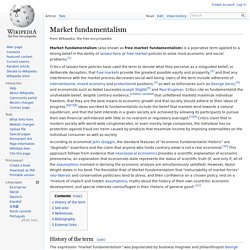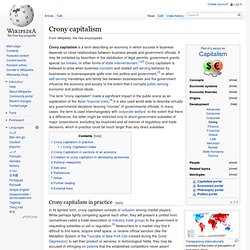

Resources. Graphic3a_0.gif (GIF-afbeelding, 836x1170 pixels) - Geschaald (71%) Market Fundamentalism. Market fundamentalism (also known as free market fundamentalism) is a pejorative term applied to a strong belief in the ability of laissez-faire or free market policies to solve most economic and social problems.[1] Critics of laissez-faire policies have used the term to denote what they perceive as a misguided belief, or deliberate deception, that free markets provide the greatest possible equity and prosperity,[2] and that any interference with the market process decreases social well being.

Users of the term include adherents of interventionist, mixed economy and protectionist positions,[3] as well as billionaires such as George Soros,[4] and economists such as Nobel Laureates Joseph Stiglitz[5] and Paul Krugman. History of the term[edit] Neoliberalism. Patent wars, Silicon Valley, and DIY software innovators. Siri Stafford/Thinkstock Images.
This article arises from Future Tense, a collaboration among Arizona State University, the New America Foundation, and Slate. On Feb. 29, Future Tense will host an event on the Make movement and do-it-yourself innovation in Washington, D.C. For more information and to sign up for the event, please visit the NAF website. Crony Capitalism. Crony capitalism is a term describing an economy in which success in business depends on close relationships between business people and government officials.

It may be exhibited by favoritism in the distribution of legal permits, government grants, special tax breaks, or other forms of state interventionism.[1][2] Crony capitalism is believed to arise when business cronyism and related self-serving behavior by businesses or businesspeople spills over into politics and government,[3] or when self-serving friendships and family ties between businessmen and the government influence the economy and society to the extent that it corrupts public-serving economic and political ideals. The term "crony capitalism" made a significant impact in the public arena as an explanation of the Asian financial crisis.[4] It is also used world wide to describe virtually any governmental decisions favoring "cronies" of governmental officials. Crony capitalism in practice[edit] Crony Capitalism Index[edit] USA restoring fiscal sanity report.